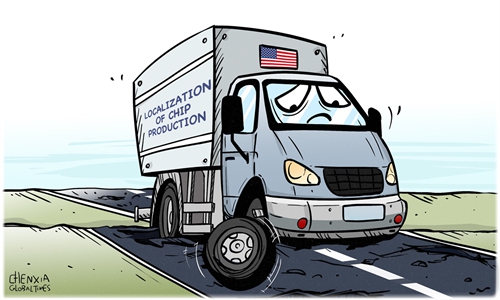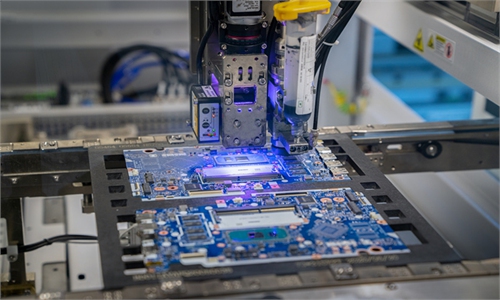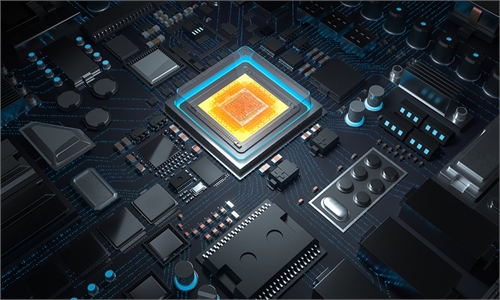
Illustration: Liu Xiangya/GT
Christophe Fouquet, the CEO of ASML, a leading Dutch chip equipment manufacturer, has said that the geopolitical landscape indicates the US will persist in exerting pressure to impose stricter restrictions on ASML's exports to China, according to a report by Reuters."One of the debates is, is it really about national security? The other debate you start to see ... is does it help us or does it hurt us? I see a lot of companies in the US that start to also ask that question," he said at a Bloomberg technology conference in London, noting that the Netherlands and Europe are debating whether further restrictions fall under national security or trade policy, and whether they would even work.
The concerns expressed by the CEO of ASML not only reflect his personal apprehensions and those of the company, but also underscore a rising skepticism among companies and industry stakeholders regarding the so-called "national security" rhetoric, which is used by the US government to impose restrictions on trade in the semiconductor industry and the disruption of normal cooperation within the supply chain.
It is no longer a secret that the narratives about "national security" concocted by some American politicians are groundless. The narratives are solely designed to justify restrictions on China's development in the semiconductor field, attempting to exclude China from global semiconductor industry cooperation. However, this is doomed to fail.
Economic and trade cooperation is driven by fundamental economic and market principles, and artificial geopolitical maneuvers cannot hinder the development of major trends. However, the US is now attempting to disrupt established industrial cooperation in the global semiconductor sector, which is not only detrimental to the US but also has a negative impact on global industrial cooperation in the semiconductor sector. As a result, it will inevitably face increasingly strong resistance.
Take ASML as an example. It is closely connected to the global semiconductor industry chain, including China, with the interests of all parties intertwined. Analyzing this industry chain reveals a situation where everyone benefits.
In 2023, ASML derived 29 percent of its sales from China. However, due to US interference in the company's normal trade relations with Chinese enterprises, the company expects that in 2025, the contribution of the Chinese market to its total revenue will decrease to about 20 percent, CNBC reported on October 16.
The Chinese market holds irreplaceable significance for ASML. This is reflected in the revenue from direct sales, and it's also related to the company's long-term development and global strategic layout. China is a vast market and a crucial part of the global supply chain. In the era of globalization, no company can afford to overlook the influence of the Chinese market.
China's semiconductor industry is experiencing a rapid development phase. National-level policy support and financial investment from businesses have led to an increasingly improving semiconductor industry chain in China. For ASML, this means more collaboration opportunities and greater market potential. Meanwhile, China's rapid advancements in fields such as artificial intelligence and 5G communication provide ample space for the application of high-end equipment like lithography machines.
"China is a very important market for ASML ... Most of this revenue is from older-generation chipmaking tools," said Chris Miller, assistant professor of international history at the Fletcher School of Law and Diplomacy at Tufts University, CNBC reported.
As Miller pointed out, ASML's exports to China are largely focused on products of mature technologies. That means they have little to do with national security issues. This is undoubtedly a strong rebuttal to the so-called "national security" excuse used by the US to put arbitrary restrictions on ASML.
The US suppression of China's semiconductor industry under the guise of "national security" is, in fact, an act of economic bullying. It is unfair treatment of Chinese companies and a disruption to the global semiconductor supply chain. The doubts of ASML's CEO also represent the sentiments of many businesses, which hope to engage in commercial activities in a fair and stable environment, rather than being swayed by US geopolitical maneuvers.
The author is a reporter with the Global Times. bizopinion@globaltimes.com.cn



